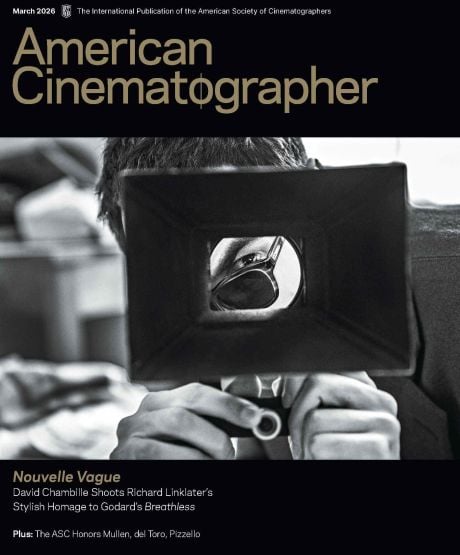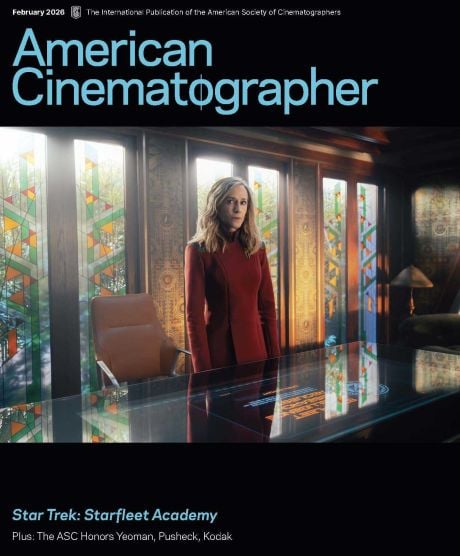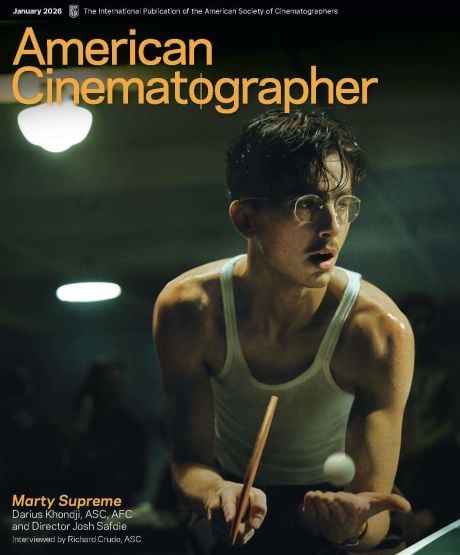
Steven Poster, ASC Sounds Off
The ICG National President discusses encouraging new talent, the worldwide community of cinematography, the legacy of Sarah Jones and other key issues.
The ICG National President discusses encouraging new talent, the worldwide community of cinematography, the legacy of Sarah Jones and other key issues.
Portrait by Danna Kinsky
Since 1996, the International Cinematographers Guild (ICG) has drawn attention to promising young filmmakers. Under its Emerging Cinematographers Awards, a jury selects deserving short films to offer a hand-up to members who are ready to enter the market as cinematographers. At the recent Camerimage International Film Festival in Poland, Steven Poster, ASC, national president of the ICG, spoke with American Cinematographer about this program, Camerimage’s Student Etudes competition, and other issues facing the union.
American Cinematographer: Can you describe how the Emerging Cinematographers program works?
Steven Poster, ASC: This is the 21st year of Emerging Cinematographers. It started as a kind of family affair. When I became president of Local 600 about 10 years ago, I realized the potential to turn this small, internal contest into more of a community affair.
The purpose of the Emerging Cinematographers award is to give an opportunity, a chance for exposure and education, to anybody in the union who is not yet designated a director of photography. Camera assistants, camera operators, DITs and still photographers are all eligible. Anybody who has completed a short in the previous year can enter as long as they're not designated as a director of photography.
We get about 100 shorts a year to judge. We have a blue ribbon committee across the country that does the judging.
In September, we have a full weekend of events. The first part is a luncheon at the ASC Clubhouse. For our sponsors and the winners and some of the press, that's always a thrill, many have never been in the building before. Any young cinematographer anywhere in the world knows the American Society of Cinematographers. For them to have an event in their honor at the ASC Clubhouse is wonderful.
On Saturday they get to sit with a group of three or four agents. We do a roundtable for about four or five hours where they discuss with the agents how to start their career, how to boost their career, how to market themselves, how to be individuals within the business.
Sunday, we have the event at the Directors Guild theater, a screening and reception afterwards. We nearly fill the Directors Guild theater every year, about 600 seats. A month later we have a screening and reception in New York, then in Atlanta, Chicago, and then Camerimage.
Apart from business details, is there a way for the winners to get advice from older cinematographers?
A number of our more senior members always participate in these events. But we also have a fledgling mentoring program, where members sign up to mentor, mentees sign up, and we match them. It's just started over the last few months, and there's quite a bit participation.
You're also involved with this year's Student Etudes competition.
I'm on the jury, yes. The last time I was on the jury for student films it was one day of watching films and judging. This time it was three days of watching films and judging. It's always a thrill to have a group of colleagues — directors, writers, other cinematographers — working on judging these films and discussing them. It's a fun event. And this year was exceptionally good, with a number of good films.
What are the criteria for judging? Does someone with more resources have an advantage?
I don't think so. Some of these films are quite accomplished. It's not that they don't have the resources, because they do. First of all, the schools around the world that these young cinematographers come from give them tremendous training and opportunities.
And for these shorts as well as those in Emerging Cinematographers, I have to say that our colleagues and sponsors, the manufacturers and the suppliers, the rental houses, the laboratory resources, are all so incredibly generous to these young filmmakers. This kind of support has been going on as long as I've been in the business. I've never known a time when the rental houses weren't totally generous with their equipment to allow young filmmakers to make their films.
Can you detect someone's talent even if they might not have had much experience?
Of course. That's the beauty of these programs. Talent is innate. Experience is gained. But when you see work that someone who has talent and realize that that person is on the road to being an accomplished cinematographer, it's very exciting. You can see it in the work no matter how big or small the resources are.
One of the wonderful things about Camerimage is that this is a family affair. When you come here and you see people from all over the world interacting with each other, being friends, going to parties, talking cinematography, talking technology, talking working conditions, talking about the movies they've made — you realize that we're in a kind of a golden age of a worldwide family. It's no longer just the American Society of Cinematographers or Imago, the Italian society of cinematographers or the Polish Society of Cinematographers. It is a world community of cinematographers.
I think this was probably the best and most exciting Camerimage I've been to. The participation of the cinematographers was extraordinary this time. To have the range of talent from the youngest to the most experienced was very exciting.
One of the beautiful parts of this film festival is that everybody talks to everybody. Everybody's accessible. Nobody is on the kind of ego trip that wouldn't allow them to talk to any of the cinematographers who approach them.
So many cinematographers come up and want to talk. It's exciting because they're excited, it's fun because I can hear what they're doing.
Of course I spread the word of trade unions, which is very important to talk about in terms establishing a worldwide camaraderie between us.
At the Imago ASC panel I was able to show the [Handheld Filming in Vehicles (Free Driving)] video that was produced by Local 600. So many people came up to me afterward and said, "I'll never do that again, I'll never take my operator's life in my hands, I'll never put my operator or anybody else in the car in danger." That's very gratifying.
Spreading the word of safety for all our crews is very important. I'm excited about the enthusiasm that I see for that kind of safety consciousness. It's been growing ever since Sarah Jones was killed by the train [on the set of Midnight Rider in 2014].
It was a tragedy. Sarah was an amazingly lovely and sweet human being. She was so enthusiastic about working. When you think about the stupidity of an act like that, it takes your breath away. And I give credit to Sarah's parents and family, who have kept this crusade for safety alive. It's really wonderful. If I say "Safety for Sarah," people all over the world know what I'm talking about.
Unions in general have been suffering in this country. There are many politicians who would like to destroy unions entirely.
No doubt about it. Unions are not favored by right-wing politicians and big business. But the entertainment industry, especially motion pictures and television, is the most unionized industry in America today. I would say easily 85% of all professional work in motion picture and television business is unionized.
That talks to the strength of the international union, we have a wonderful IATSE international president in Matt Loeb. His direction is for growth and strength. And a tremendous amount of organizing is going on all over the country. You can't begin to shoot a movie now without at least the attempt of it being organized. Everybody wants to be in the union, and the non-union workers always help to organize.
Unions brought us a lot that we sometimes take or granted, like the 40-hour work week.
We have weekends because of unions. Listen, unions were the organizations that created a middle class in America. And it's a falsehood when politicians try to portray unions as self-serving. Unions protect their members. That's the whole point of them.
How is the ICG handling diversity?
I see a certain amount of growth in diversity every year in the business. You have to start somewhere in order to get somewhere.
We're in an unusual period, especially in the case of the courage people have shown to come forward and express their experiences, these difficult experiences that they've had over their lives. To be a woman or a person of color in this field, any field, especially politics and the entertainment business — It's terribly difficult any time you're dealing with people who are more powerful than you, who have gotten away with outrageous behavior over the years, because in that culture they wouldn't be punished, but even worse the victims who were assaulted then ended up harassed, or were not powerful enough to even speak up.
All of a sudden the dam has broken. It's a good thing, a powerful moment in history. And as serious as this subject is, I think it's as important to understand that we are seeing the entrance into the industry of a much more diverse workforce. Yes, the percentages are still not great. But our percentages have increased. You see it in schools, a diverse population in film and media schools who are in the next few years going to be entering the business.
It's a really good time I think for women and people of color who are just starting out in the business. But I personally can't wait for the time when we no longer say women cinematographers, but we say cinematographers. I'm waiting for the time, and I see it coming, where the idea of women and people of color are normalized within the industry and there are just cinematographers, they're just people who work in the industry. That will be a wonderful time.
What does the ICG do to protect women?
If something comes to us, we immediately investigate. For example if it's a studio, we participate in investigations with the studio. These are not isolated instances, they happen. When we hear about it we do everything we can.
We don't always hear about it right away. It's so difficult to come forward. Now it's a little better.
To tell you something about our level of involvement with diversity, two years ago our executive director retired after a 30-year career. We hired a high-end search firm and found Rebecca Rhine, who's been with us now for two years as National Executive Director. She is wonderful, fiercely protective of all our members.
Camerimage 2017 Student Etude winners:
Laszlo Kovacs Student Award - Golden Tadpole – All of Us
DoP: Felix Striegel
Dir. Katja Benrath
School: Hamburg Media School (HMS)
Silver Tadpole: Across the Street
DoP: Tom Durand
Dir. Jeanne Privat
School: Institut National Superieur des Arts du Spectacle et des Techniques de Diffusion (INSAS)
Bronze Tadpole: Rocco
DoP: Martín Urrea
Dir. Gerard Nogueira
School: Escola Superior de Cinema i Audiovisuals de Catalunya (ESCAC)
Directors of photography for Emerging Cinematographers:
David Auerbach: Red Lopez
George Billinger: The Gate
Kristen Correll: La Sirena
Daniel Friedberg: LoveBird
Michael Lockridge: (le) Rebound
Jeff Powers: Will Wilson
Roham Rahmanian: Break the Will
Jen Schneider: Unbound



